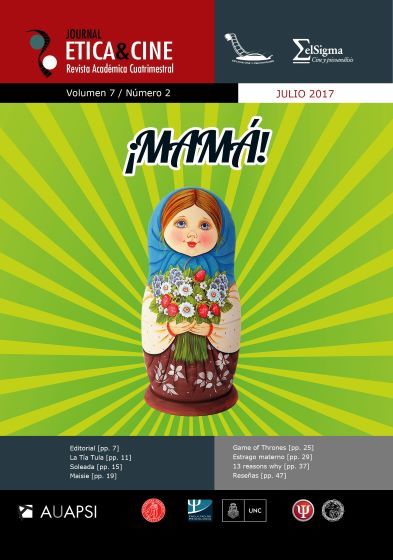The maternal ravage as a psychoanalytic concept
DOI:
https://doi.org/10.31056/2250.5415.v7.n2.18976Keywords:
Maternal ravage, Desire-of-the-Mother, Insufficiency of the Father, Maternal superegoAbstract
The clinical reflection on the “maternal ravage” is an effort to analyze whether it should rise to the level of a concept within psychoanalytic theory. By naming it, Lacan exposes the constitutive nature of the phenomenon as the inherently deadly side of the libidinization that the Desire-of-theMother introduces in the genesis of the subject. This is how the hypothesis emerges that this term refers to a structural fact to be studied within the clinic of the neuroses, in both male and female sexed subjects. Given the ravage responds to the failure of the symbolic to envelop the mother’s enjoyment, the father-symptom’s insufficiency to interpret the maternal desire is questioned, to the extent that the latter is backed up by another void: the absence of a significant that can articulate the female sex in the unconscious. Therefore, if the father-symptom also has a structural failure to make of the mother a woman who causes his desire, then both sexes have difficulties in accepting the woman within herReferences
Freud, S. (1924) El sepultamiento del complejo de Edipo. En Obras completas, Tomo XIX (pp. 177-188). Buenos Aires: Amorrortu, 1976-79.
Freud, S. (1931) Sobre la sexualidad femenina. En Obras completas, Tomo XXI (pp. 223-244). Buenos Aires: Amorrortu, 1976-79.
Freud, S. (1933) Conferencia 33. “La feminidad”. En Nuevas conferencias de introducción al psicoanálisis. En Obras completas,Tomo XXII (pp. 104-125). Buenos Aires: Amorrortu, 1976-79.
Freud, S. (1937) Análisis terminable e interminable. En Obras completas, Tomo XXIII (pp. 211-254). Buenos Aires: Amorrortu,1976-79.
Klein, M. (1935) Contribución a la psicogénesis de los estados maníaco-depresivos. En Obras completas, Tomo 1 (pp. 267 295).Buenos Aires: Paidós, 1990.
Klein, M. (1937) Amor, culpa y reparación. En Obras completas, Tomo 1 (pp. 310-345). Buenos Aires: Paidós, 1990.
Lacan, J. (1933-37). Intervenciones en la SPP. En Intervenciones y textos 1 (pp. 5-31). Buenos Aires.
Lacan, J. (1938) Los complejos familiares en la formación del individuo. En Otros escritos (pp. 33-96). Buenos Aires: Paidós, 2012.
Lacan, J. (1956-57) El seminario. Libro IV. La relación de objeto. Buenos Aires: Paidós, 1994.
Lacan, J. (1957-58) El seminario. Libro V. Las formaciones del inconsciente. Buenos Aires: Paidós, 1999.
Lacan, J. (1958) La significación del falo. En Escritos 2 (pp. 653- 662). Buenos Aires: Siglo XXI, 2012. Lacan, J. (1958) Juventud de Gide o la letra y el deseo. En Escritos 2(pp. 703-726). Buenos Aires: Siglo XXI, 2012.
Lacan, J. (1958-59) El seminario. Libro VI. El deseo y su interpretación. Buenos Aires: Paidós, 2014.
Lacan, J. (1961-62) El seminario. Libro IX. La identificación. Inédito.
Lacan, J. (1962-63) El seminario. Libro X. La angustia. Buenos Aires: Paidós, 2006.
Lacan, J. (1964a) Posición del inconsciente. En Escritos 2 (pp. 789- 808). Buenos Aires: Siglo XXI, 2012.
Lacan, J. (1964b) El seminario. Libro XI. Los cuatro conceptos fundamentales del psicoanálisis. Buenos Aires: Paidós, 1987.
Lacan, J. (1969-70) El seminario. Libro XVII. El reverso del psicoanálisis. Buenos Aires: Paidós, 1992.
Lacan, J. (1972) El atolondradicho. En Otros escritos (pp. 473-522). Buenos Aires: Paidós, 2012.
Lacan, J. (1972-73) El seminario. Libro XX. Aún. Buenos Aires: Paidós, 2006.
Lacan, J. (1973). Televisión. En Otros escritos (pp. 535-572). Buenos Aires: Paidós, 2012.
Lacan, J. (1973-74) El seminario. Libro XXI Los desengañados se engañan (Los nombres del padre). Inédito.
Lacan, J. (1974-75) El seminario. Libro XXII R.S.I. Inédito.
Lacan, J. (1978-79) El seminario. Libro XXVI. La topología y el tiempo. Inédito.
Moliner, M. (2007) Diccionario de uso del español. Madrid: Gredos, 2007.
Real Academia Española (2014) Diccionario de la lengua española (23° ed.) Tomo I. Madrid: Planeta, 2014
Zawady, M. (2017). El estrago materno y la inexistencia de La mujer. (En prensa).
Downloads
Published
Issue
Section
License
Los autores que publiquen en Ética y Cine Journal aceptan las siguientes condiciones:
Los autores/as conservan los derechos de autor © y permiten la publicación a Ética y Cine Journal, bajo licencia CC BY-SA / Reconocimiento - Reconocimiento-CompartirIgual 4.0 Internacional. La adopción de esta licencia permite copiar, redistribuir, comunicar públicamente la obra, reconociendo los créditos de la misma, y construir sobre el material publicado, debiendo otorgar el crédito apropiado a través de un enlace a la licencia e indicando si se realizaron cambios.

Este obra está bajo una licencia de Creative Commons Reconocimiento-CompartirIgual 4.0 Internacional.




